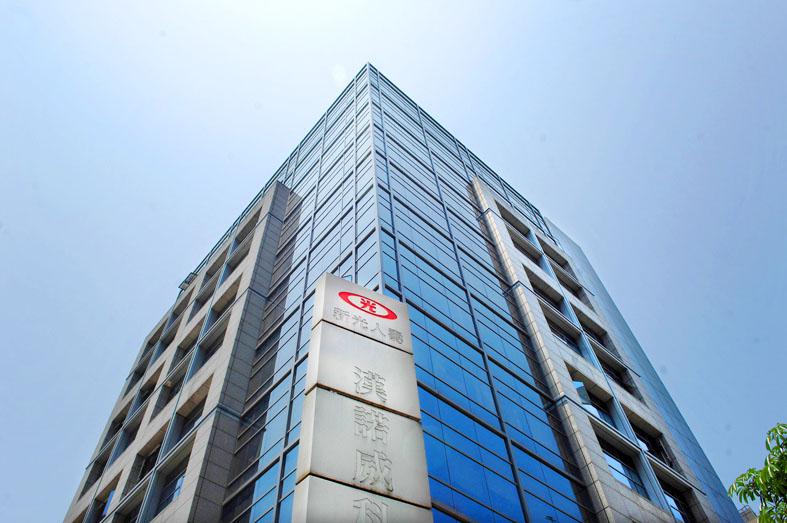The Financial Supervisory Commission yesterday fined Shin Kong Life Insurance Co (新光人壽) NT$7.2 million (US$252,233) for embezzlement and other irregularities, as the regulator seeks to bolster corporate governance.
The penalty, the third that the Taipei-based insurer has received this year, was imposed after routine inspections found that Shin Kong insurance agents embezzled clients’ money and the company failed to conduct thorough probes, the commission said.
Shin Kong Life has been given three monetary penalties this year totaling NT$38.8 million, the commission said.

Photo: CNA
Thirty-two customers filed 46 complaints involving NT$26.63 million in premiums, it said.
Several forms were submitted by agents bearing the same addresses and telephone numbers for policyholders, with the data being from family members of the agents, it said.
Additionally, agents exaggerated coverage and promised fee refunds when pitching policies, it said.
Shin Kong did not investigate the complaints or penalize implicated agents before closing the cases, the commission said.
The insurer also failed to look into policies where the agents and loan brokers were the same people, which opens the door to unhealthy sources of income, it said.
Shin Kong Life has been asked to take disciplinary action against rogue sales agents and their supervisors, in proportion with their misdeeds, the commission said.
Fitch Ratings on Monday last week lauded the increased frequency and severity of sanctions imposed by the commission on domestic financial institutions, saying that the moves reflect the regulator’s determination to boost corporate governance of the sector.

CHIP RACE: Three years of overbroad export controls drove foreign competitors to pursue their own AI chips, and ‘cost US taxpayers billions of dollars,’ Nvidia said China has figured out the US strategy for allowing it to buy Nvidia Corp’s H200s and is rejecting the artificial intelligence (AI) chip in favor of domestically developed semiconductors, White House AI adviser David Sacks said, citing news reports. US President Donald Trump on Monday said that he would allow shipments of Nvidia’s H200 chips to China, part of an administration effort backed by Sacks to challenge Chinese tech champions such as Huawei Technologies Co (華為) by bringing US competition to their home market. On Friday, Sacks signaled that he was uncertain about whether that approach would work. “They’re rejecting our chips,” Sacks

NATIONAL SECURITY: Intel’s testing of ACM tools despite US government control ‘highlights egregious gaps in US technology protection policies,’ a former official said Chipmaker Intel Corp has tested chipmaking tools this year from a toolmaker with deep roots in China and two overseas units that were targeted by US sanctions, according to two sources with direct knowledge of the matter. Intel, which fended off calls for its CEO’s resignation from US President Donald Trump in August over his alleged ties to China, got the tools from ACM Research Inc, a Fremont, California-based producer of chipmaking equipment. Two of ACM’s units, based in Shanghai and South Korea, were among a number of firms barred last year from receiving US technology over claims they have

It is challenging to build infrastructure in much of Europe. Constrained budgets and polarized politics tend to undermine long-term projects, forcing officials to react to emergencies rather than plan for the future. Not in Austria. Today, the country is to officially open its Koralmbahn tunnel, the 5.9 billion euro (US$6.9 billion) centerpiece of a groundbreaking new railway that will eventually run from Poland’s Baltic coast to the Adriatic Sea, transforming travel within Austria and positioning the Alpine nation at the forefront of logistics in Europe. “It is Austria’s biggest socio-economic experiment in over a century,” said Eric Kirschner, an economist at Graz-based Joanneum

BUBBLE? Only a handful of companies are seeing rapid revenue growth and higher valuations, and it is not enough to call the AI trend a transformation, an analyst said Artificial intelligence (AI) is entering a more challenging phase next year as companies move beyond experimentation and begin demanding clear financial returns from a technology that has delivered big gains to only a small group of early adopters, PricewaterhouseCoopers (PwC) Taiwan said yesterday. Most organizations have been able to justify AI investments through cost recovery or modest efficiency gains, but few have achieved meaningful revenue growth or long-term competitive advantage, the consultancy said in its 2026 AI Business Predictions report. This growing performance gap is forcing executives to reconsider how AI is deployed across their organizations, it said. “Many companies